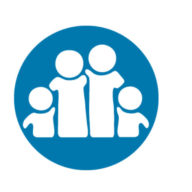A recent FAN presentation by Lydia Denworth, author of Friendship: The Evolution, Biology, and Extraordinary Power of Life’s Fundamental Bond, discussed an important and surprising public health topic: FRIENDSHIP.
 As we engage in Holiday traditions and gatherings, we are hopefully experiencing the benefits of added opportunities for social connection. We know that humans are social animals, that we enjoy being with friends, but the benefits go deeper than that.
As we engage in Holiday traditions and gatherings, we are hopefully experiencing the benefits of added opportunities for social connection. We know that humans are social animals, that we enjoy being with friends, but the benefits go deeper than that.
- Spending enjoyable time together (play)
- Sharing and helping
- Being kind, loyal, and trustworthy
 The Holiday Season is a good time to engage in social connection.
The Holiday Season is a good time to engage in social connection. 
It may come in mundane moments from a neighbor or family member asking about your day, an invitation to go ice skating, or advice on a project. Couples’ therapist, John Gottman, describes these moments as “bids for connection” and he recommends “turning towards” these bids as a way to encourage emotional connection.
It might take some practice to better see these requests as opportunities and think about responding differently to deepen your relationships. Try to notice people reaching out, asking you to:
- Show interest in their accomplishments
- Share stories of your day/your life with them
- Be affectionate with them
- Join them in an adventure
- Join them in learning something new
- Work on a project with them
- Pay attention to what they are saying
- Respond to a joke
- Help them relax / have fun
You can also reach out to people with these same “bids.” It’s likely someone is willing to join, to help, to pay attention or have fun with you.
Give yourself permission to prioritize friendship and relationships the way you would any activity scientifically proven to enhance your wellbeing.

 But, if the goal is to be compassionate rather than “fix” something, we are not helpless. Surprisingly, simply turning towards the difficulty, acknowledging the situation and letting the person know that you see their struggle and you care, can be very powerful. This is often referred to as “Name it to Tame it” among clinicians. Naming that you see their struggle and being kind and compassionate can help remind a struggling person that they’re not alone. It is powerful to know that while feelings may be painful, they are not dangerous, and that the bonds of connection hold even when things get tough.
But, if the goal is to be compassionate rather than “fix” something, we are not helpless. Surprisingly, simply turning towards the difficulty, acknowledging the situation and letting the person know that you see their struggle and you care, can be very powerful. This is often referred to as “Name it to Tame it” among clinicians. Naming that you see their struggle and being kind and compassionate can help remind a struggling person that they’re not alone. It is powerful to know that while feelings may be painful, they are not dangerous, and that the bonds of connection hold even when things get tough.
Some responses to try when a friend is facing struggle can include:
- “I don’t have a solution, but I care…I’m here for you.”
- “Would you like to take a walk? We don’t have to talk; I can just be with you.”
- Using “both…and” “Sometimes it’s both exciting to be hosting and it’s also stressful, it makes sense that you are irritable. You have a lot going on.”
- “This is really hard…it’s ok…sometimes I feel that way, too.”
- Plan some time together one-on-one or after the holidays. Big groups and festive occasions may be overwhelming for folks. A quiet setting might be preferred for deeper conversations.
There are many ways to be a good friend, and the benefits of having close relationships are clear. Turning towards bids for connection and support, practicing compassion and kindness, making time for friendships —these are all efforts that give to others and make a positive difference in our community. Best of all they offer huge benefits for both the giver and the receiver!
>>Send a link to this blog (Read this my Friend!) to a friend to let them know that your time spent with them is as important as a healthy diet and regular exercise!






